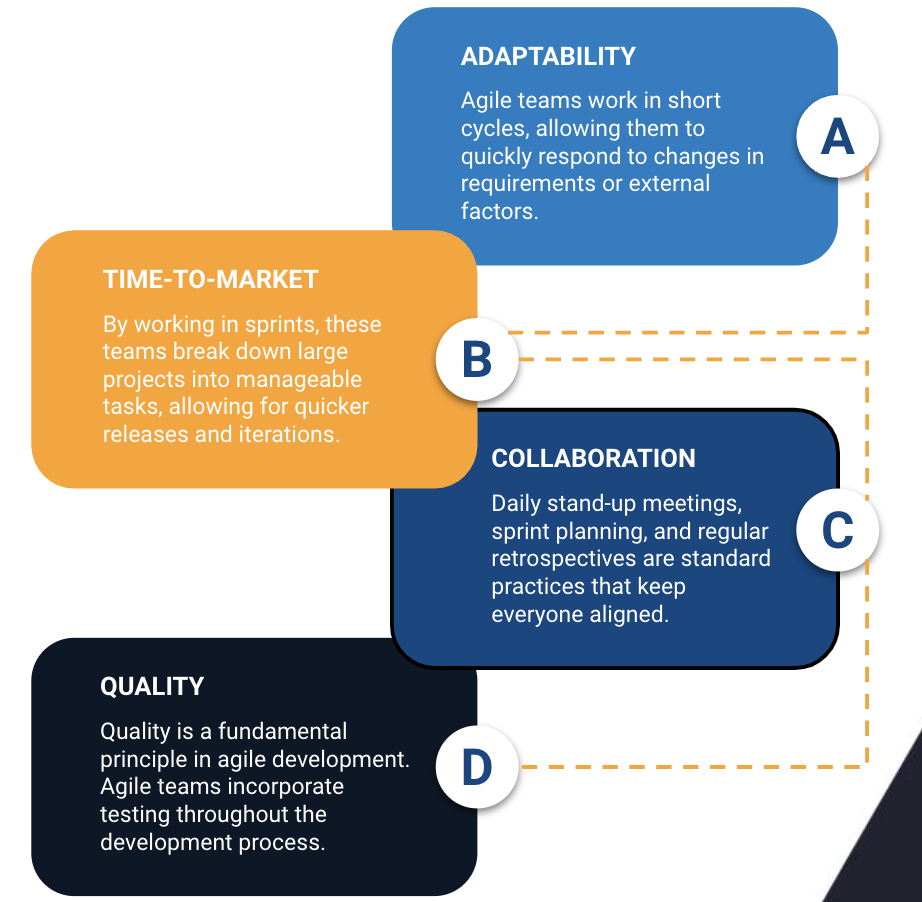
In today's fast-paced tech environment, having the right team to support your software project can be a game-changer. An agile team brings flexibility, speed, and efficiency, helping you adapt to changes and meet project goals more effectively. In this article, we'll explore the key benefits of working with agile teams, how they elevate your projects, the principles they follow, and examples of their impact.

The advantages of having an Agile Team for your software project
1. Adaptability and flexibility
One of the core benefits of an agile team is its ability to adapt. Unlike traditional development methods, agile teams work in short cycles, allowing them to quickly respond to changes in requirements or external factors. Whether it’s new customer feedback, emerging market trends, or unforeseen technical challenges, an agile team can pivot efficiently, ensuring your project remains on track and relevant.
2. Faster Time-to-Market
Agile teams excel at delivering value quickly. By working in sprints, these teams break down large projects into manageable tasks, allowing for quicker releases and iterations. This method not only accelerates the development process but also enables you to test and validate features faster. Businesses can launch their software in shorter timeframes, gaining a competitive advantage and adapting their offerings based on user feedback.

3. Enhanced collaboration and communication
An agile team thrives on open communication and collaboration. Daily stand-up meetings, sprint planning, and regular retrospectives are standard practices that keep everyone aligned. This structure promotes transparency and accountability, reducing misunderstandings and ensuring that every team member is clear about their tasks and goals. Moreover, agile teams work closely with stakeholders, providing consistent updates and incorporating their feedback, resulting in a product that truly meets business needs.

4. Focus on quality and continuous improvement
Quality is a fundamental principle in agile development. Agile teams incorporate testing throughout the development process, ensuring that every feature is thoroughly checked before moving forward. This proactive approach reduces bugs and technical debt, leading to a more reliable and stable product. Additionally, through continuous improvement practices like sprint reviews and retrospectives, agile teams constantly refine their processes and workflows, optimizing productivity and outcomes.
5. Empowerment and ownership
Agile teams operate with a sense of ownership and responsibility. Each team member is empowered to make decisions, contribute ideas, and take initiative. This ownership not only fosters a sense of accountability but also boosts team morale and motivation. When each member is committed and invested in the project's success, the overall productivity and creativity of the team improve, leading to a more innovative and high-quality product.
Incorporating an agile team into your software project can significantly elevate its success. From adaptability and faster time-to-market to improved communication and a focus on quality, agile teams bring a dynamic and efficient approach that traditional methods cannot match. By choosing to work with an agile team, you are investing in a flexible, collaborative, and results-driven approach that ensures your project’s success.

